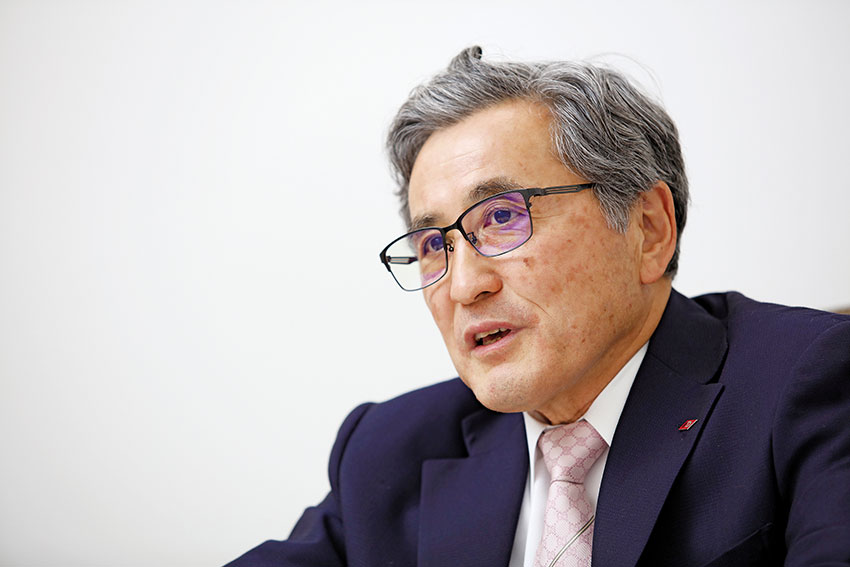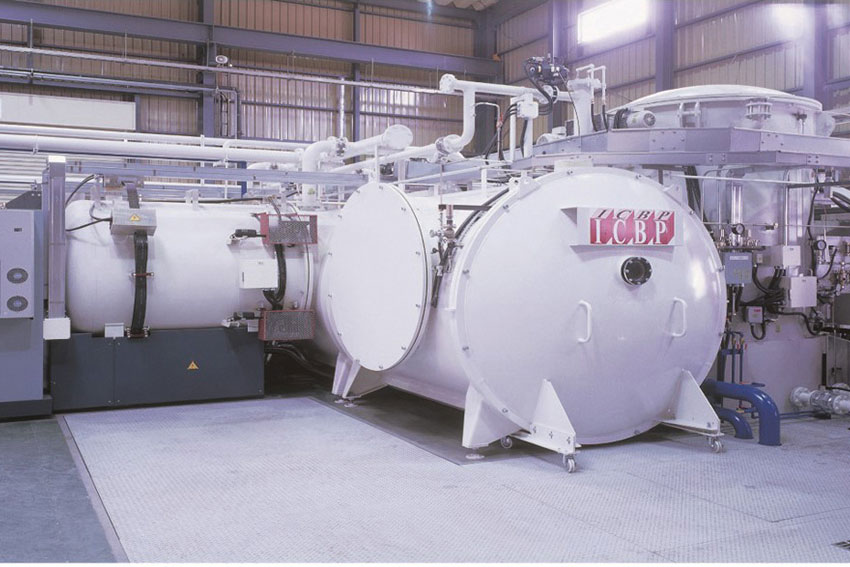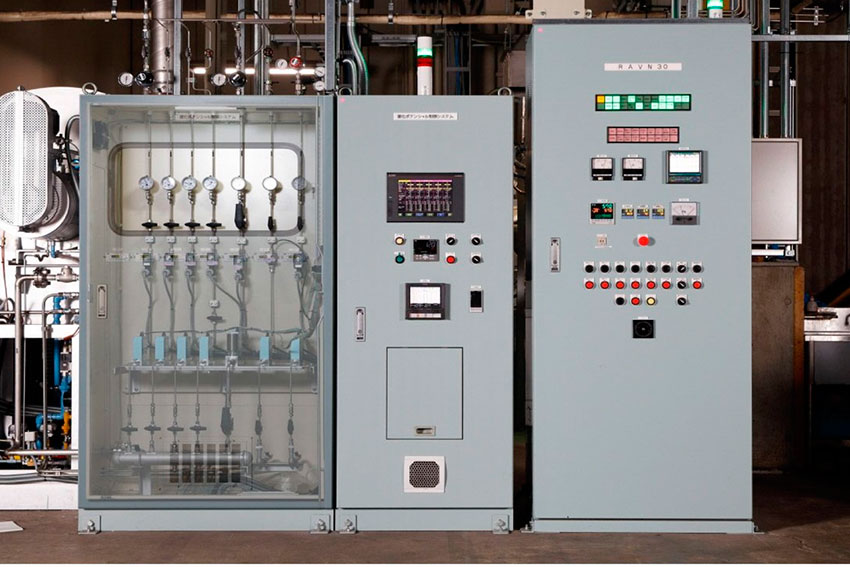Established in 1956, Parker Netsushori Kogyo (PNK) forms part of the wider Nihon Parkerizing Group and is striving forward on a mission of growing global sales through increased new development of its heat-treating technologies. Company president Masataka Watanabe explains some of the elements behind the growth.

The Japanese industry has come under huge pressure in recent years from regional competitors in Korea, Taiwan and China who have replicated Japanese processes and products but at a much cheaper cost. Nevertheless, we still see Japanese firms retaining leadership in high-mix-low-volume fields. Could you give us your take on the advantages of Japanese monozukuri?
I believe that the power of Japanese monozukuri is gradually weakening. Looking at our regional competitors, China, South Korea or Taiwan, we really have to think about how much our Japanese monozukuri power is still going to thrive, and I am not certain to what extent it is going to. I think our company's monozukuri is a bit different from the general Japanese monozukuri, which is about using craftsmanship to create niche, unique and specific components. That power is related to the Japanese monozukuri. In that sense, Japan still has the capability to produce in a high-mix-low-volume production style. The way I see it, however, we will not be able to sustain Japan's economy just by doing that. PNK's monozukuri spirit is surely responding to the needs of the customers and ensuring the delivery of high-quality services to them. By doing that, we are able to satisfy and delight our customers.
Many detractors in the media are pointing out that Japan's monozukuri is under threat by the population decline. Recently, Nikkei published an article stating that Japan needs 6.75 million foreign workers in order to sustain economic development by 2040. These demographic pressures are shrinking of the domestic market and making it harder for companies to recruit staff. How is your company reacting to those population changes, especially in terms of your Business Continuation Plan (BCP)?
PNK has two major policies that we are moving forward with. The first policy is to sell our products globally, and the second is to move ahead with automation and robotization of our domestic plants - our chemical plants or heat-treating factories. Our company is made up of three business divisions, one of which is manufacturing and selling chemicals. In that division, we are not only looking to sell our products domestically, but we are also aiming to strengthen our overseas sales. It is good timing to do so, especially with the depreciation of the yen. We have given the go signal to our chemical plants to push forward full automation. Through this policy of automation, we will be able to supplement the work done by older people who will eventually retire and leave the plant. Moreover, we can stabilize the quality through automation. For the equipment division, we are also asking them to strengthen the sales of their plants overseas. More than just creating something on our own, I am telling our employees to form a partnership or an alliance with component manufacturers, for example, that is not limited to domestic manufacturers but also expanding to overseas manufacturers. Lastly, I have told our heat-treating division to expedite the automation of their plant and factories to reduce the costs and lead to a high-quality accomplishment. PNK is proceeding with these initiatives so that we can respond to the aging population, declining birthrate as well as the shrinking market that is a result of the present demographic situation.
The fully automatic ICBP vacuum carburizing furnace is PNK's joint development with ECM Technologies, a French company with which you have had relations since the 1990s. It has a special cold lining which can reduce CO2 emissions. Could you explain this technology in more detail to our readers and how it helps reduce CO2 emissions?
ECM has been our long-term partner, and we have been doing co-development and sales together. Controlling CO2 emissions is recently becoming stringent. This kind of vacuum heat treatment is becoming a trend globally. Hence, we want to take hold of this good opportunity and expand ICBPs. In the Japanese domestic market, these are the ECM's high-quality ICBP furnaces.
Even our Japanese clients now want to reduce their CO2 emissions. Rather than using their existing conventional heat treatment furnaces that release CO2, they are going into vacuum heat treatment. We are receiving more and more inquiries and needs from them. For them to consider procuring our furnaces, we are trying to explain their merits, such as their ability to reduce CO2 emissions. Another significant merit is concerning the aging of the population. There are many matured technicians with craftsmanship in manufacturing automobiles or components. However, with them going away, the vacuum furnace comes in handy because it can be operated with just one click of a button. With that, we will not need to have so many of those matured technicians anymore. Because we want to contribute to society, ECM and PNK actively exchange detailed information to expand these products. PNK's policy is to sell these vacuum furnaces along with other furnaces that can contribute to the reduction of CO2 emissions, but we want to sell ICBPs to contribute to achieving a sustainable society or SDGs as a company. These vacuum or new types of furnaces tend to use electricity. Therefore, if the Japanese government does not have a secure electricity policy, then CO2 emissions will not be reduced. It is the same thing with EVs.

ICBP
Given the success of your relationship with ECM Technologies, a French company, are you looking for more foreign technical tie-ups or partnerships in other areas of your business that could help you?
Besides ECM, we are also looking for tie-ups and alliances with foreign heat treatment companies.
Since its establishment in 1956, PNK has become a comprehensive heat treatment company today. What are some of the most key technical milestones you would identify in your history? What are some of the key products that you are looking to showcase to the world?
PNK started with isonite treatment, which is a liquid salt bath nitriding and a molten heat treatment technology. It was developed by Degussa in Germany, but we were the ones that first brought it into Japan and further developed it. At that time, isonite treatment was openly accepted by the automobile industry, then it expanded from there. We had 25 factories in Japan doing the isonite treatment. To respond to that trend within the Nihon Parkerizing Group, PNK supplied the chemicals and equipment. In the second phase, the customers started to require more than isonite; they wanted gas-heat treatment furnaces. We borrowed the technology from Degussa for the initial phase, once again, then later sold it. With that history, we were able to come up with our unique design in manufacturing to develop our own gas furnaces. I think that was the second stage. The third stage was reached when we partnered with ECM and sold the vacuum furnaces in Japan. It continues to sell very well in the Japanese market. In the fourth stage, which has not been too long ago, we changed the sales strategy for our furnaces. Instead of selling all kinds of furnaces, we decided to target certain furnaces to be sold from PNK. Hence, we are a more specialized furnace provider than a comprehensive furnace provider. We are trying to focus on selling vacuum furnaces, austemper furnaces, isonite equipment and gas nitriding furnaces. There are reasons for deciding to focus on these four types of equipment. We chose to proactively sell vacuum furnaces because it is very helpful in CO2 emission control. In the austempering treatment furnace market, we have the largest share and we want to keep it that way. By selling these furnaces, we also sell the chemicals that go along with them, making a synergistic effect. Isonite equipment is our responsibility because we are the only one that does it. We also sell chemicals, so we will keep on sustaining this business. Finally, we resolved to move ahead with selling the gas nitriding furnaces since we were able to develop a special gas nitriding furnace with an integrated nitrogen control system, which is an added value.
Of course, we will not decline requirements and requests for a certain furnace from our customers. We will respond to their needs, but we want to focus on these equipment furnaces. Since we are a small company, we need to concentrate and input our assets into specific areas. Therefore, we made up our minds to employ this strategy.

Gas nitriding technology
Aside from the isonate process, you also developed the PNT process, which is a composite electroplating treatment. It has been used in F1 cars, WRCs and Super GT cars that require very high-end technical specifications. Can you tell us more about your R&D process? How are you able to develop these unique technologies, and is there a new process or product that you have recently launched?
We make sure to dig into our customers' needs and issues in order to gain a more comprehensive understanding. After which, we develop the equipment or processes that best fit their needs and issues. We consider ourselves to be a heat treatment consultant company that develops technologies together with our clients. With automobile and automobile component manufacturers transitioning to EVs, it was made evident that they do not have many heat treatment or material technicians anymore. The lack of this is an issue that they cannot solve on their own, and that is where we come in to support them. Ultimately, we want to introduce the best fit equipment or heat treatment for them. Our next R&D policy states that if the technology to be developed is not number one or number two in Japan and globally, we should not develop it. I keep saying that if we are developing a technology that is in the third or fourth position, it would be better to partner or have a co-development with the leading two manufacturers. Once we are behind on a certain technology, regardless of whether we invested talent or money, we will not be able to keep up with those that are already ahead of us. Rather than trying to keep up, we should be borrowing their capabilities. It is all about open innovation. We are co-researching with universities and other companies to regain momentum in those lagging technologies. A new technology that we were able to develop is the nitrogen control system for our nitriding treatment process, which was developed based on the needs of our customers. We have high expectations for this technology.
As an example, EV gears expel a lot of heat because their rotation speed is very fast. A normal heat treatment, including the vacuum heat treatment, softens the hardened workpiece, but that does not happen using the nitriding process because it is resistant to heat. This process has not been used until now, as it is heat-resistant, and the depth is shallow. With our system, however, we can tackle that depth issue and go down deeper. Furthermore, due to the low heat treatment temperature, gear distortion is lessened. After a normal heat treatment process, a grinding process happens to improve the accuracy. Since there is not much distortion with the nitriding process, we do not need that grinding process at all. Hence, our system is receiving a lot of attention for EV gears, so we are hoping this can be further introduced through PR. We are also concentrating on reusing - a regenerative treatment, such as regenerative aluminum or chemicals.
You provide the Palnic and Pal coat thin film deposits for electronics. Electronic miniaturization has been advancing each year, and the latest Apple chip has 10 billion transistors. Hence, there is a huge need to dissipate heat with these electronic devices. How are your surface treatments and technologies helping to meet that trend in the electronic industry?
Palnic is actually developed by our parent company, Nihon Parkerizing, treatment. I am not really sure to what extent that can apply to miniaturized components. With regard to extremely precise components, we are still unsure how much our heat treatment process or surface treatment technology can be applied. Because we are a big, specialized company in the surface treatment field, there are already many examples where our technologies are being used in precise components. We are thinking about exploring other fields that have yet to use heat treatment and technologies. A new area or market will be the energy field, like the components for wind power generators. Since they have already started to use heat treatment, a market already exists. We are trying to advertise our products and technologies aimed at that market and maybe semiconductor equipment components that are also now requiring heat treatment. Moreover, we are attempting to go into aluminum brazing, which is another specialized unique process. When I was in Europe last week and talked with several heat treatment companies and equipment manufacturers, they expressed the same opinion as I have. If we only focus on the automobile sector, then our sales will not be stabilized. We all agreed that we need to pursue diverse fields and advertise our products & technologies in different areas. We plan to move in that direction.
Which countries will be on your road map in terms of your expansion? Moving forward, which particular countries or regions will you focus on for growth, and what strategy will you do to set up there?
Our three business divisions employ different overseas strategies. Southeast Asia is one appealing market for our chemical division, and we are considering having sales agents to actively do our sales. Europe is also an attractive market for chemicals. We can either deploy sales agents or take advantage of our existing partner companies there to sell our products. We are eyeing China as well, but there are numerous local companies that sell very cheap products. Although it can be a bit difficult for us to do business there, China is a potential market. Therefore, we want to have our sales agents in China and go ahead with the sales.
For the equipment division, we want to strengthen our sales in the Southeast Asian market because the automotive industry is changing. We want to further pursue that market since we see that there is an increasing need for vacuum furnaces. Currently, we have jobbing plants in South Korea and China. However, at this stage, we are not thinking of adding more to those. It is probably going to be Nihon Parkerizing that will further increase our foreign jobbing plants.
That is how we want to push forward with our global strategy. We do not want to take so much time in implementing them, so we will go with deploying sales agents and partnering with foreign firms that have the same requirements as us. We already have the expertise and experience that allow us to build good relationships with foreign partners, and we want to expand that to other partners in overseas markets.
Imagine we come back four years from now for your 70th anniversary as a company and have this interview all over again. What would you like to tell us? What are your dreams for the company, and what goals would you like to have accomplished by then?
We are often called a comprehensive heat treatment company, but my dream is to go into specialized heat treatment. Rather than offering a wide range of heat treatments, we want to become a more specialized company. We want our clients to think that if they rely on PNK for the specialized technology they need, PNK can respond to them. In this field, people will be rushing to us for their needs to be solved. In case we cannot become a specialized company that responds to the customized needs of our clients on our own, we have to look for their solutions with global partners. By working with them, we can find and collect information globally that will enable us to provide the optimal heat treatment for a particular client. We want to become a customer centric company while providing our specialized technology. If we can successfully achieve that, we will be able to contribute to society, satisfy our customers and be more profitable.
0 COMMENTS